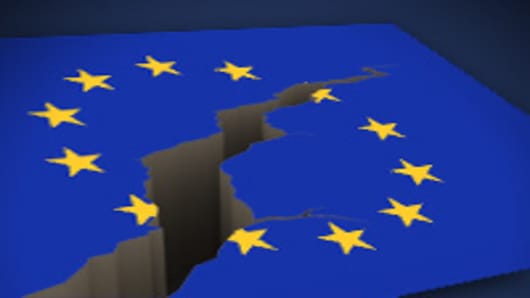Remember U.K. politician Harriet Harman and her reference to what was unacceptable in “the court of public opinion”? She was referring to bankers’ remuneration, but what a pity that that same court wasn’t in session when she and her party backed some of the more controversial decisions of late.
Public opinion is of value to governing politicians only when it is in line with their prevailing decision making. I read this week of a poll suggesting that 51 percent of German voters would like a return to the deutschmark (yes I know, it’s amazing — 49 in every 100 German taxpayers want to keep the euro!)
But their opinion was never asked for in the first place, when the EU decided to proceed with the great euro project. Why should it matter now? The EU has never been one to address public opinion to any great extent. Nothing about its governance and decision making could be called truly “democratic”. The decision to adopt the euro was a political one, and the decision to continue with it will be a political one. Public opinion need not apply.
So at the risk of being shot down in flames in a matter of months, if not weeks, I conclude from last week’s pronouncements from the ECB and Mario Draghi that the euro is safe for now. No break up in 2012, or indeed in 2013. How so? Because of the subtlety behind ECB bond buying actions.
In the short term, it can back Spanish and Italian (and any other euro zone) sovereign debt, which calms investor fears and brings relief to bond yields. But everyone knows it’s a temporary expedient, until the EU moves to fiscal and political union. But that takes time — years in fact, and markets don’t have the patience to wait for this. So cue the ECB to step in and provide the support necessary until the longer-term solution is delivered.
This direct support of the euro is what is taking place now, to all practical intents and purposes. The ECB is independent and immune to the influence of any government, but that is in theory. In practice, it is underpinning the single currency, in the same way that it supported EU banks’ funding requirements by lending 3-year money to them. A 5-year facility was mooted recently, which would truly make a nonsense of the expression “lender of last resort”.
Provided EU governments use the time bought by the ECB to start looking at political union, and announce plans to move towards that, the currency will be safe. That’s a big if. But one is inclined to think that the break-up scenario is too awful for Angela Merkel et al to contemplate, which is why I expect this route to euro salvation.
Of course fiscal integration is just the first step. The economic mismanagement evident in the southern euro zone still has to be paid for, and at some stage, perhaps this time next year, we should see common Eurobonds issued to cover EU-wide sovereign debt, and fiscal transfers (to write off debt) from north to south. At any stage this could all still unravel. But in the meantime expect the ECB to provide as much support to the single currency as is credible.
The words and actions from the ECB this week confirm that when push comes to shove, it is as independent as any other independent central bank. In other words, its independence never seems to stop it from working towards goals that are identical to those of EU governments.
Professor Moorad Choudhry is Treasurer, Corporate Banking Division, Royal Bank of Scotland.
"The views expressed in this article are an expression of the author’s personal views only and do not necessarily reflect the views or policies of The Royal Bank of Scotland Group plc, its subsidiaries or affiliated companies, or its Board of Directors. RBS does not guarantee the accuracy of the data included in this article and accepts no responsibility for any consequence of their use. This article does not constitute an offer or a solicitation of an offer with respect to any particular investment."


